Without role models, mentors and sponsors, dreams shrivel like ‘A Raisin in the Sun’
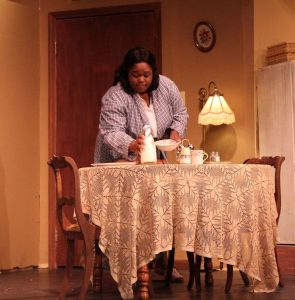 There remain just four more performances of Theatre Conspiracy’s production of Lorraine Hansberry’s A Raisin in the Sun. Since its Broadway premiere nearly 60 years ago, the play has been touted as an anthem about upwardly-mobile African-American families grappling with pernicious racial bigotry and injustice. But in the context of the play, racism is just one of many obstacles that the Youngers must overcome in order to realize their dreams. And it’s dreams, or more precisely, aspirations, that lie at the heart of A Raisin in the Sun.
There remain just four more performances of Theatre Conspiracy’s production of Lorraine Hansberry’s A Raisin in the Sun. Since its Broadway premiere nearly 60 years ago, the play has been touted as an anthem about upwardly-mobile African-American families grappling with pernicious racial bigotry and injustice. But in the context of the play, racism is just one of many obstacles that the Youngers must overcome in order to realize their dreams. And it’s dreams, or more precisely, aspirations, that lie at the heart of A Raisin in the Sun.
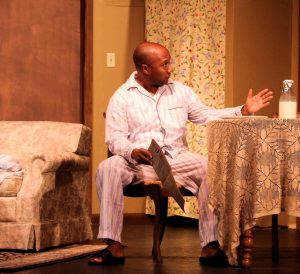 One needn’t search any farther than the title to realize the crucial importance that aspirations play in Hansberry’s unqualified theatrical masterpiece. It obtains from a stanza in Langston Hughes’ poem “Harlem” that asks “What happens to a dream deferred? Does it dry up like a raisin in the sun?” At best, Hughes suggests, people who defer their dreams lead minimal, marginalized lives. At worst, settling for less, or nothing at all, will lead to psychological problems, physical illness and even violence.
One needn’t search any farther than the title to realize the crucial importance that aspirations play in Hansberry’s unqualified theatrical masterpiece. It obtains from a stanza in Langston Hughes’ poem “Harlem” that asks “What happens to a dream deferred? Does it dry up like a raisin in the sun?” At best, Hughes suggests, people who defer their dreams lead minimal, marginalized lives. At worst, settling for less, or nothing at all, will lead to psychological problems, physical illness and even violence.
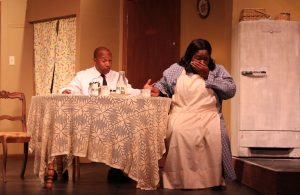 “When a man reaches a certain age, his mortality becomes very real and it forces him to examine his life in a certain context,” notes Derek Lively, who portrays Walter Younger in the play. “If you haven’t done certain things, that can eat away at your spirit, your soul. Walter expresses his pain and fear in the form of anger. And that becomes dangerous. The only
“When a man reaches a certain age, his mortality becomes very real and it forces him to examine his life in a certain context,” notes Derek Lively, who portrays Walter Younger in the play. “If you haven’t done certain things, that can eat away at your spirit, your soul. Walter expresses his pain and fear in the form of anger. And that becomes dangerous. The only 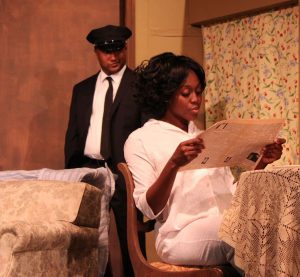 thing that separates anger from danger is the ‘d.’”
thing that separates anger from danger is the ‘d.’”
But Lively’s character is not the only one suffering the ill effects Hughes postulated from postponing their dreams. Walter’s wife, Ruth, is equally afflicted.
“Ruth had big dreams and big goals when [she and Walter] started out in their marriage,” comments Cantrella Canady of her character. “ Yes, she loves her son and she loves her husband, but she feels the weight of their situation – 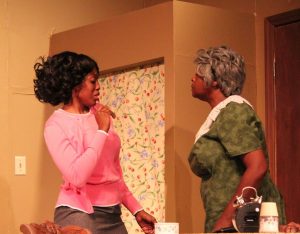 their cramped home, not having any money, having to go out and still make it work. Ruth is the one who’s grounded in reality. While everyone else has their big dreams and plans, her own dreams and plans died a long time ago. And that’s hard on her.”
their cramped home, not having any money, having to go out and still make it work. Ruth is the one who’s grounded in reality. While everyone else has their big dreams and plans, her own dreams and plans died a long time ago. And that’s hard on her.”
But perhaps the character who is most adversely affected by the diminished lives being led by Walter and Ruth is their son, Travis.
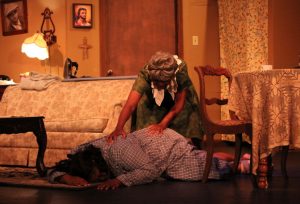 “He hears all this talk about how everyone’s unable to realize their dreams,” Keehnon Jackson astutely observes. Kids see and hear so much more than their parents and grandparents realize, and they internalize the overt and subliminal messages they receive. “It really affects him, really scares him because that’s likely to be his future too.”
“He hears all this talk about how everyone’s unable to realize their dreams,” Keehnon Jackson astutely observes. Kids see and hear so much more than their parents and grandparents realize, and they internalize the overt and subliminal messages they receive. “It really affects him, really scares him because that’s likely to be his future too.”
And then Travis’ 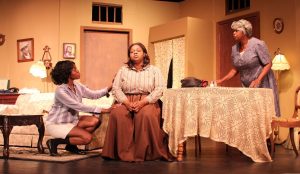 grandfather dies unexpectedly, leaving behind a life insurance policy that pays his widow, Lena, a large death benefit. “Lena feels trapped by her age, by the dreams that haven’t been fulfilled, the things that she and her husband wanted to give to their children,” confides Patricia Idlette, who plays the role of the Younger matriarch.
grandfather dies unexpectedly, leaving behind a life insurance policy that pays his widow, Lena, a large death benefit. “Lena feels trapped by her age, by the dreams that haven’t been fulfilled, the things that she and her husband wanted to give to their children,” confides Patricia Idlette, who plays the role of the Younger matriarch. 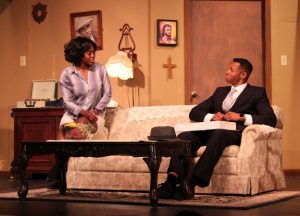 “So when this money comes along in this unfortunate way, it’s a way out of her trap, giving her the ability to give [her children and grandson] some sort of legacy.”
“So when this money comes along in this unfortunate way, it’s a way out of her trap, giving her the ability to give [her children and grandson] some sort of legacy.”
The legacy that Mama has in mind is a home of their own.
“They’ve been living in this old, cramped two-bedroom apartment for a very, 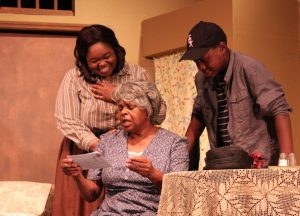 very long time,” notes Director Sonya McCarter. “I think we can all relate to being stuck in a place where we don’t want to be and it weighing on us and bringing us down. Sometimes we feel joyless because we can’t move out of that cramped space.”
very long time,” notes Director Sonya McCarter. “I think we can all relate to being stuck in a place where we don’t want to be and it weighing on us and bringing us down. Sometimes we feel joyless because we can’t move out of that cramped space.”
That’s certainly the case for Lena’s long-suffering daughter-in-law, Ruth, who can’t wait to jettison the family’s South Side Chicago apartment 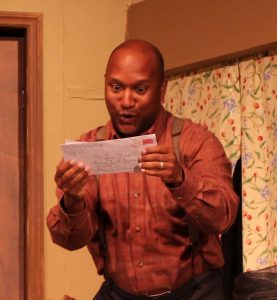 in which Travis has to sleep on the couch, her mother-in-law and sister-in-law share a bedroom, and they all share a single bathroom.
in which Travis has to sleep on the couch, her mother-in-law and sister-in-law share a bedroom, and they all share a single bathroom.
But not everyone shares Mama’s dream of home ownership. Ruth’s sister-in-law, Beneatha, dreams of being a doctor, and Walter yearns to own his own business. After years of squiring wealthy folks around as their chauffeur, he’s come to realize that to be successful, a man has to own his own business. His dream is to own and operate a liquor store serving the local black community. But it’s 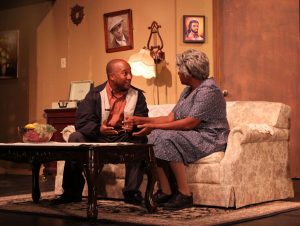 not just about providing his family with a better lifestyle and showering them with the trappings of success. To Walter’s way of thinking, the American dream for African-Americans has to be larger than just home ownership. The way out of poverty and social oppression is for blacks to become leaders of business, banking and industry.
not just about providing his family with a better lifestyle and showering them with the trappings of success. To Walter’s way of thinking, the American dream for African-Americans has to be larger than just home ownership. The way out of poverty and social oppression is for blacks to become leaders of business, banking and industry.
“Walter is a king without a 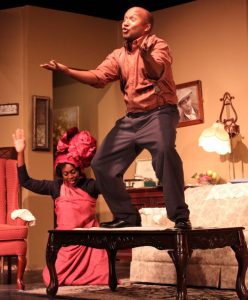 kingdom,” Lively sagely observes. “When a man doesn’t have his own kingdom, and a lot of black men don’t, that is a very, very difficult place to be, especially as your mortality starts to catch up with you.”
kingdom,” Lively sagely observes. “When a man doesn’t have his own kingdom, and a lot of black men don’t, that is a very, very difficult place to be, especially as your mortality starts to catch up with you.”
And herein lies an aspect of A Raisin in the Sun that has heretofore gone unexamined. How can people struggling under the yoke of poverty like Walter, Ruth and Beneatha succeed in business or a profession such as medicine or even law without role models to emulate or mentors and sponsors to guide them through a process so fraught with challenges and risk?
Oh, there are n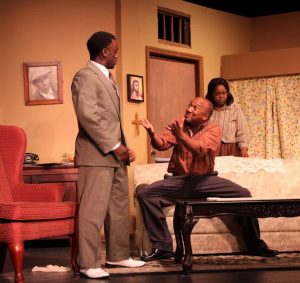 umerous examples of people who succeed by dint of hard work and their own instincts and gut feelings. But many successful entrepreneurs freely credit role models, mentors and sponsors with contributing to their success. Facebook’s Mark Zuckerberg was mentored by Steve Jobs. Jobs, in turn, was mentored by early Apple investor and executive Mike Markkula. Eric Schmidt mentored Larry Page and Sergey Brin of Google. And Warren Buffett sought out Benjamin Graham after reading the latter’s book, The Intelligent Investor.
umerous examples of people who succeed by dint of hard work and their own instincts and gut feelings. But many successful entrepreneurs freely credit role models, mentors and sponsors with contributing to their success. Facebook’s Mark Zuckerberg was mentored by Steve Jobs. Jobs, in turn, was mentored by early Apple investor and executive Mike Markkula. Eric Schmidt mentored Larry Page and Sergey Brin of Google. And Warren Buffett sought out Benjamin Graham after reading the latter’s book, The Intelligent Investor.
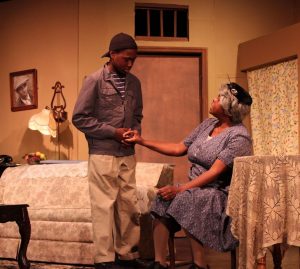 Research and surveys prove that having a mentor is important to success. In a 2013 executive coaching survey, 80 percent of CEOs said they received some form of mentorship. In a study conducted by Sage, 93 percent of startups reported that mentorship was instrumental in their success. Mentors and sponsors don’t just provide timely advice. They supply invaluable connections and steer neophyte entrepreneurs clear of pitfalls and prat falls, like being taken advantage of
Research and surveys prove that having a mentor is important to success. In a 2013 executive coaching survey, 80 percent of CEOs said they received some form of mentorship. In a study conducted by Sage, 93 percent of startups reported that mentorship was instrumental in their success. Mentors and sponsors don’t just provide timely advice. They supply invaluable connections and steer neophyte entrepreneurs clear of pitfalls and prat falls, like being taken advantage of  by an unscrupulous scam artist.
by an unscrupulous scam artist.
Had Walter Younger had a mentor or sponsor, he might have been the one to found ABC Fine Wine & Spirits rather than Jack Holloway. But people mired in poverty typically don’t know successful business men or 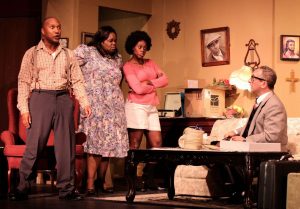 women or have access to mentors or sponsors who are willing and able to facilitate their success. If you are the product of the five people with whom you spend the majority of your time, then how can the impoverished ever be anything but economically poor?
women or have access to mentors or sponsors who are willing and able to facilitate their success. If you are the product of the five people with whom you spend the majority of your time, then how can the impoverished ever be anything but economically poor?
But what Walter and Beneatha Younger lack in role models, mentors and sponsors when it comes to matters of money, 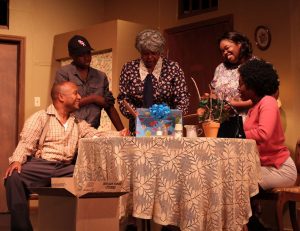 Mama more than makes up for when it comes to teaching her children right from wrong. When Beneatha disavows her brother after he loses the money for her education, Mama pointedly asks her daughter, “Child, when do you think is the time to love somebody the most? When they done good and made things easy for everybody? Well then, you ain’t through learning—because that ain’t the time at all. It’s when he’s at his lowest and can’t
Mama more than makes up for when it comes to teaching her children right from wrong. When Beneatha disavows her brother after he loses the money for her education, Mama pointedly asks her daughter, “Child, when do you think is the time to love somebody the most? When they done good and made things easy for everybody? Well then, you ain’t through learning—because that ain’t the time at all. It’s when he’s at his lowest and can’t 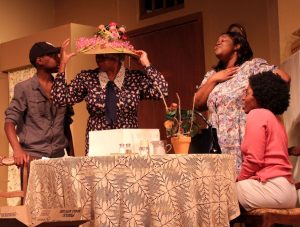 believe in hisself ’cause the world done whipped him so!”
believe in hisself ’cause the world done whipped him so!”
She’s the one who underscores for her son the immorality of accepting money from the Clybourne Park Welcome Committee not to move where they’re not wanted. And she tells Ruth, “He finally come into his manhood today … kind of like a rainbow after the rain …” after Walter turns down the Committee’s bribe 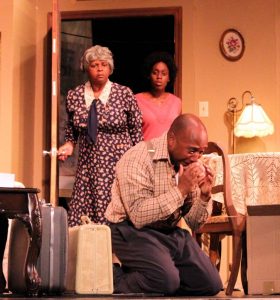 “because my father—my father—he earned [that house] for us brick by brick,” adding for the benefit of his son, Travis, “we don’t want to make no trouble for nobody or fight no causes, and we will try to be good neighbors, and that’s all we got to say about that.”
“because my father—my father—he earned [that house] for us brick by brick,” adding for the benefit of his son, Travis, “we don’t want to make no trouble for nobody or fight no causes, and we will try to be good neighbors, and that’s all we got to say about that.”
The play is replete with pearls of wisdom, eloquent dialogue and heartfelt emotion such as this, which is why A Raisin in the Sun is essential theater – a timeless masterpiece that needs to see the stage often and everywhere.
Hansberry 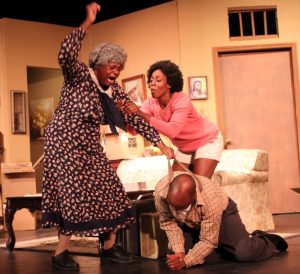 based the play on her own family’s experiences. But what makes it so universal is that in so doing, she was very, very specific. “The more specific she got, the more people of other races we able to see themselves,” McCarter comments. “The more real it becomes on the stage, the more people are able to relate regardless of what the characters or actors look like. Who among us has a family that doesn’t have issues and emotional conflict?”
based the play on her own family’s experiences. But what makes it so universal is that in so doing, she was very, very specific. “The more specific she got, the more people of other races we able to see themselves,” McCarter comments. “The more real it becomes on the stage, the more people are able to relate regardless of what the characters or actors look like. Who among us has a family that doesn’t have issues and emotional conflict?”
And so the drama resonates with other lives similarly cramped 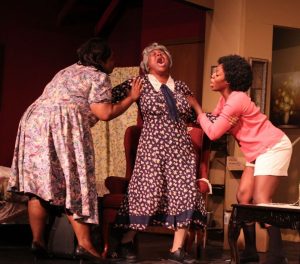 by poverty. The main focus, though, is firmly and deliberately on black experience. This, Hansberry said, is “a Negro play before it is anything else”.
by poverty. The main focus, though, is firmly and deliberately on black experience. This, Hansberry said, is “a Negro play before it is anything else”.
“There are so many things in this play that I absolutely love, that are inspiring and encouraging,” McCarter adds. “I consider it a great privilege to have the opportunity to direct it.”
May 6, 2018.
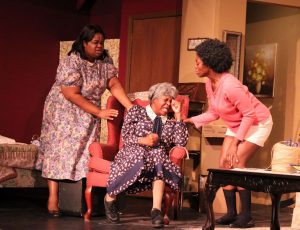 RELATED POSTS.
RELATED POSTS.
- ‘A Raisin in the Sun’ considered one of 20th Century’s greatest plays
- ‘Raisin in the Sun’ a race relations conversation starter
- ‘Raisin in the Sun’ actor Patricia Idlette in the spotlight
- ‘A Raisin in the Sun’ actor Cantrella Canady in the spotlight
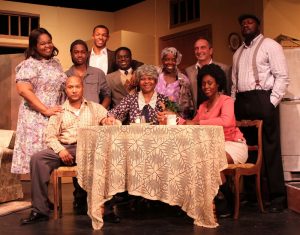 ‘A Raisin in the Sun’ actor James Robinson in the spotlight
‘A Raisin in the Sun’ actor James Robinson in the spotlight- ‘A Raisin in the Sun’ actor Sandra Dixon in the spotlight
- ‘A Raisin in the Sun’ play dates, times and ticket info
- Community talk-backs to follow two ‘Raisin in the Sun’ performances
- ‘A Raisin in the Sun’ director Sonya McCarter in the spotlight














 Tom Hall is both an amateur artist and aspiring novelist who writes art quest thrillers. He is in the final stages of completing his debut novel titled "Art Detective," a story that fictionalizes the discovery of the fabled billion-dollar Impressionist collection of Parisian art dealer Josse Bernheim-Jeune, thought by many to have perished during World War II when the collection's hiding place, Castle de Rastignac in southern France, was destroyed by the Wehrmacht in reprisal for attacks made by members of the Resistance operating in the area. A former tax attorney, Tom holds a bachelor's degree as well as both a juris doctorate and masters of laws in taxation from the University of Florida. Tom lives in Estero, Florida with his fiancee, Connie, and their four cats.
Tom Hall is both an amateur artist and aspiring novelist who writes art quest thrillers. He is in the final stages of completing his debut novel titled "Art Detective," a story that fictionalizes the discovery of the fabled billion-dollar Impressionist collection of Parisian art dealer Josse Bernheim-Jeune, thought by many to have perished during World War II when the collection's hiding place, Castle de Rastignac in southern France, was destroyed by the Wehrmacht in reprisal for attacks made by members of the Resistance operating in the area. A former tax attorney, Tom holds a bachelor's degree as well as both a juris doctorate and masters of laws in taxation from the University of Florida. Tom lives in Estero, Florida with his fiancee, Connie, and their four cats.